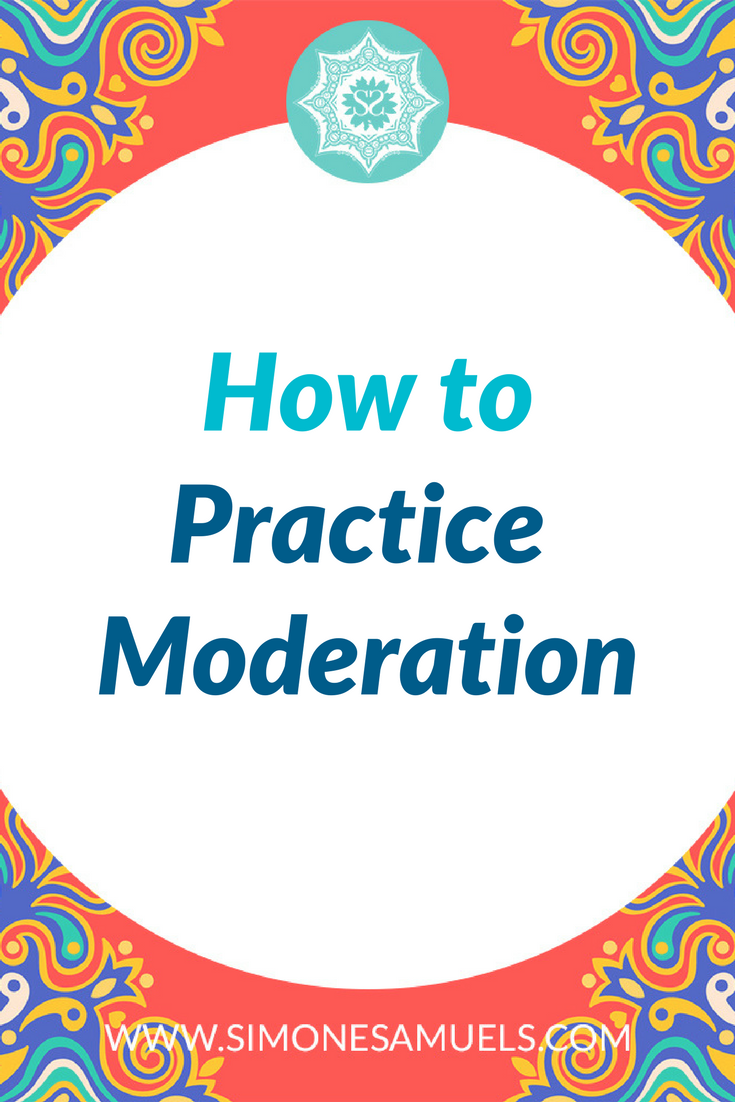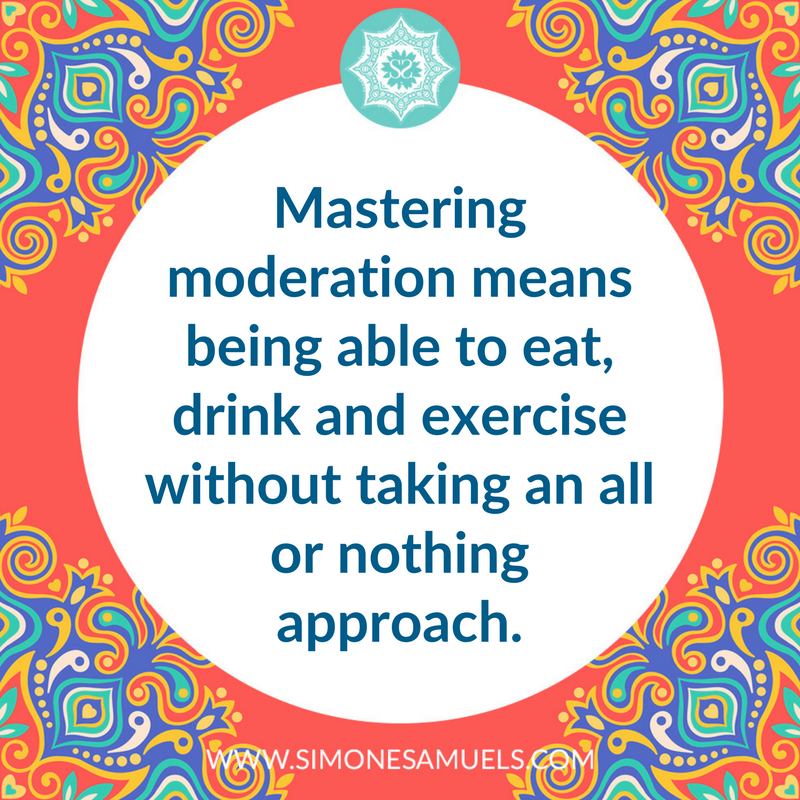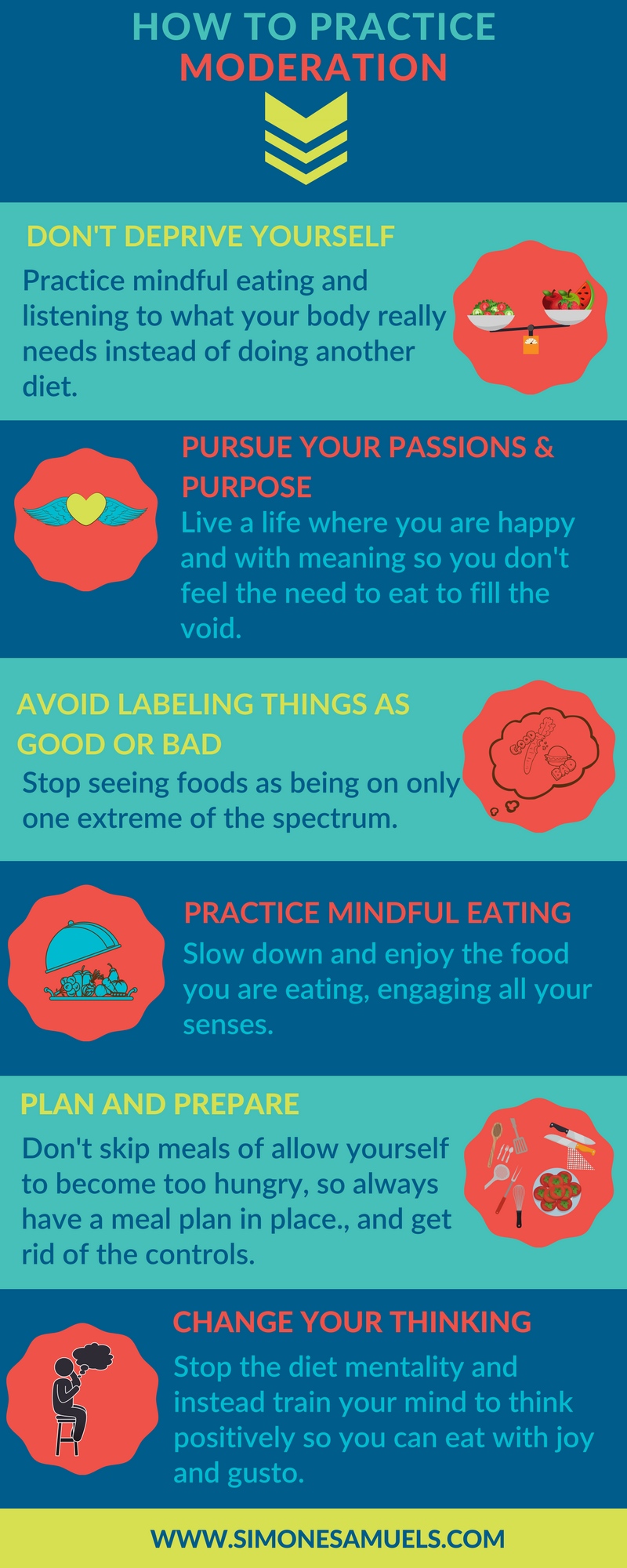That expression “do everything in moderation” has been around forever, but how hard is it to actually live a life of moderation? For most of us who are trying overcome binge-eating or emotional eating, moderation seems nothing but elusive, right?
There is a constant cycle of excess then deprivation, then excess again. We will deprive ourselves of food we love, or cut our whole food groups which we worry will trigger us to binge, or embark on extreme exercise, or drink ourselves into oblivion. It seems we are trapped between two extremes where there is no middle ground- it is black or white, with no grey area where moderation exists.
Of course, living our lives on either end of the spectrum is unhealthy- not just for our body and mind, but for our souls. We should be able to eat comfort foods occasionally, and really enjoy those foods without any guilt. We should be able to have a couple of drinks a few times a week without becoming drunk. We should be able to exercise so that it feels good and allows our body enough to time to rest and recover and not be injured.
So, what’s the trick to being able to eat, drink and exercise in moderation most of the time rather than taking an all or nothing approach? Mastering motivation requires practicing these six things regularly. When you do, it becomes easier to avoid the extremes and excesses and its then possible to reach a state of equilibrium that is healthy as well as enjoyable.
1. Don’t deprive yourself
We have all been there- the moment you decide to go on a diet and stop eating all the delicious foods you like to enjoy, then of course those foods are all you can think about. Your thoughts become obsessive and then when you give in and essentially give up the diet, you feel nothing but guilt. Deprivation is far from moderation and only causes a loss in confidence over your ability to know what to eat and when, and means constantly living a life of extremes over food.
Instead, practice eating intuitively and listening to what your body really needs at any given time. Don't cut out entire food groups but instead aim for a clean, whole foods approach to your food choices 80% of the time, allowing 20% of the foods to ones you may desire without guilt.
2. Pursue your passions and purpose
When our lives lack meaning, we are much more likely to live on one end of the spectrum, because this allows us to focus on something which distracts us from the real problems in our lives. Instead of putting so much energy into not eating a particular way, or feeling guilty because we over-ate all the unhealthy food, we should try and tap into our passion and purpose and pursue the things that make us happy.
We're much less likely to find aspects of our life to obsess about or need to be distracted by when we are happily living a life of meaning. If you think back to times when you have indulged in an entire block of chocolate, for example, it probably was when you felt sad or lonely. That time you drank way too much wine and felt so sick from doing so, was probably because you were trying to forget about something that had happened or to drown out other negative feelings. Yet with passion and purpose we are less likely to have these low points which can lead us to making extreme choices and allows us to live much more moderately instead.
3. Avoid labeling things as good or bad
A bit like with deprivation, the moment we give food a label- it is either "good", or it is "bad"- we are only seeing foods on one extreme of the spectrum. It is totally possible to be too obsessive by only eating good foods, and to overindulge in bad foods, when really all foods can and should be enjoyed in moderate quantities.
Wine itself is not bad- it's drinking two bottles in one sitting that is, whereas a glass or two is often recommended for our cardiovascular health. Same with chocolate. A few pieces of dark chocolate eaten and enjoyed is not the same as a whole block of low quality dairy milk scoffed down with your tears. It's also possible to over-exercise and cause injury and overexertion, and to eat too much healthy fats for example, aka the keto diet fad, at the detriment of not eating enough fibre or having enough variety to keep things interesting in your diet.
4. Practice mindful eating
We have all been there- sat down to watch a movie and scoffed an entire bag of popcorn without even noticing, or quickly eaten our lunch while in a meeting or at our desk and we barely even registered what it was we had eaten. This kind of bingeing and speed eating means we end up feeling unsatisfied and eating more than our body needs.
If we were to slow down and enjoy our food we would end up eating less and having a much more moderate diet. One way to practice moderation with our eating is to slow down and make meals a meditative event in which all of your senses are engaged. Pause between each bite, savour the smell, taste and texture of the food, and try to make your meal last at least half an hour by chewing every bite several times- I share more about mindful eating in the guide within this blog post.
5. Plan and prepare
Sometimes when we don't plan our meals ahead of time, we'll end up eating whatever we can get our hands on because we are starving, or just skipping the meal altogether. A moderate approach means thinking a bit about your meals to make sure you have the ingredients you need, and something in mind to make before you get too hungry. Honouring your hunger and fullness means eating moderately rather than ravenously, or missing out on meals altogether because you weren't prepared.
6. Change your thinking
For those of us who have lived a lifetime of dieting, changing our mindset around food can be difficult. Diets are the epitome of all or nothing thinking. When you think moderately about your meal, you give yourself permission to eat what you enjoy- yes, even dessert if that is something you really would like to have. One piece of cake even a couple of times a week is not going to cause problems- it is a whole cake every day (extreme indulgence) that is problematic.
Eat with joy and gusto and skip the side of guilt. Catch yourself when negative self- talk slips its way into your thinking and change the thoughts to ones that are kind and motivating. It might also be useful to think the mantra of eating to live, not living to eat.
Like this post? Pin it for later!
Which of these tips do you think are most helpful when it comes to having more moderation around food? Does moderation seem boring or is it necessary for good overall health? Share your thoughts in the comments!





